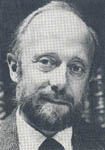The First Christmas
I am a Christian who does not believe in the virgin birth, nor in the star of Bethlehem, nor in the journey of the wisemen.
Footnotes
Endnotes
See BR articles: Kenneth R.R. Gros Louis, “Different Ways of Looking at the Birth of Jesus,” BR 01:01; J. Edward Barrett, “Can Scholars Take the Virgin Birth Seriously?” BR 04:05; and James E. Crouch, “How Early Christians Viewed the Birth of Jesus,” BR 04:05. The most comprehensive recent work in English is Raymond Brown, The Birth of the Messiah (Garden City, NY: Doubleday, 1977); see also his article “Infancy Narratives” in The Anchor Bible Dictionary, ed. David Noel Freedman (New York: Doubleday, 1992), vol. 3, pp. 410–415. See also John Meier, A Marginal Jew: Rethinking the Historical Jesus (New York: Doubleday, 1991), pp. 208–252; and, for the sociopolitical history behind the narratives, Richard Horsely, The Liberation of Christmas: The Infancy Narratives in Social Context (New York: Crossroad, 1989). Brown and Meier leave the historical question unresolved, arguing that the historicity of the virginal conception is beyond the scope of historical-critical study. See Meier, A Marginal Jew, p. 222: “Taken by itself, historical-critical research simply does not have the sources and tools available to reach a final decision on the historicity of the virginal conception.”
The reasons include the following: The stories of Jesus’ birth are found only in two relatively late sources, Matthew and Luke, both written near the end of the first century. Jesus’ birth is not mentioned in earlier sources (Mark and the letters of Paul), nor anywhere else in the New Testament. Minimally, one may infer that it was not of central importance to the early Church. Moreover, in Matthew and Luke, the stories are quite different; though some of the differences can be reconciled, not all can. Yet each narrative is strikingly harmonious with the Gospel of which it is a part, suggesting that each has been composed as a prologue. Finally, according to Mark, the family of Jesus seems not to have known about the virginal conception and his being the “Son of God” from birth. See Mark 3:21–35 and the comment on it in Meier, A Marginal Jew, p. 221: “Jesus’ brothers did not believe in him during the public ministry—which hardly seems likely if they had known about his virginal conception.” It should be noted that the passage in Mark also includes his mother.
See, for example, the “inaugural address” of Jesus in Luke 4:18–19. See also Helmut Koester’s column, “Luke’s Holy Land and Jesus’ Company,” BR 08:03, which emphasizes this aspect of Luke.
Matthew uses a variation of “this took place to fulfill what was spoken by the prophet” five times in the birth story: 1:23, 2:5–6, 2:15, 2:17–18 and 2:23. Often the claimed fulfillment ignores the original meaning of the text; for example, Matthew 2:15 cites Hosea 11:1, which clearly refers to the Exodus.
Though this is not part of the church’s “official” theology, some Christians tie the “sinlessness” of Jesus to the virgin birth—if he was not born of a virgin, how could he be without sin? For me, such an argument takes original sin, sinlessness and virgin birth too literally, as if we are dealing with biology.

